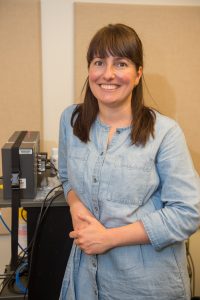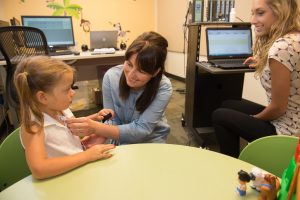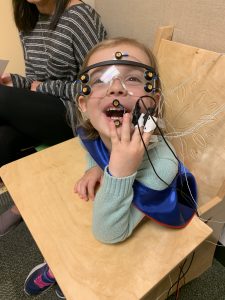Would you like to participate? contact us or email stuttering@syr.edu

Take a virtual tour of the lab!
Dr. Tumanova’s primary research interest is on the onset and development of stuttering in early childhood. Her research focuses on the way in which temperament, linguistic and speech motor control abilities may influence the development of stuttering in young children. The overarching goal of her work is to contribute to the evidence-based assessment and treatment of stuttering as well as to our understanding of why some children develop chronic stuttering while others recover without treatment.

We are currently recruiting children ages 3 to 5 who DO and DO NOT stutter to participate in the research project “The Influence of Contextual and Constitutional Emotional Processes on Speech Motor Control and Speech Motor Learning in Early Childhood Stuttering.” In this project, we are studying how excitement influences speech movement control in preschool-age children. The study participation requires three visits to the Stuttering Research Laboratory on Syracuse University campus. As a part of the study procedures participants will receive speech-language assessments and recommendations free of charge and will be compensated for their time.
We are also recruiting children who stutter from 7- to 13- years of age to participate in a speech therapy study at Syracuse University, in the Department of Communication Sciences and Disorders. The research focuses on the development of a speech treatment to help children who stutter speak easier. As a part of the study procedures participants will receive speech therapy free of charge and will be compensated for their time.
Please see detailed study procedures below. If you have any additional questions about the research or would like to participate please contact Dr. Victoria Tumanova by phone at 315.443.1118 or email stuttering@syr.edu.
“The Influence of Contextual and Constitutional Emotional Processes on Speech Motor Control and Speech Motor Learning in Early Childhood Stuttering.”
Study procedures and approximate durations:
This study is for children ages 3-5 years of age and will take place over three visits to the Stuttering Lab at Syracuse University. Each visit is approximately 1.5 hours in duration. At the first visit, your child will engage in a 10-15 minute conversation with a Researcher, during which we will measure speech disfluencies and language use and complete a series of short tests of attention and memory. Then, your child will watch a neutral video clip showing a fish tank screensaver and will be asked to repeat a simple sentence several times after an audio cue. During this speaking task your child will see pictures (color photographs) that are meant to elicit positive, negative, or neutral response. Each of the pictures will be presented to your child for a brief period. This task will take about 20 minutes and will be done at each of three visits
During presentation of the video clip and the speaking task, we will measure your child’s physiological reactions by recording your child’s heart rate, skin conductance, and respiration. Heart rate will be measured with two hypoallergenic pediatric sensors that will be placed on your child’s chest, and skin conductance will be measured through two more hypoallergenic pediatric sensors placed on his/her fingers. We will also track the movement of your child’s lips and jaw during speech. This will involve placing small adhesive “markers” on the child’s upper lip, lower lip, jaw, and forehead. The sensors and markers stick to the skin temporarily like Band-Aids. Your child will also wear modified plastic sports goggles with markers attached to them. Before attaching the sensors, we will make sure your child is comfortable with them.
While your child is being tested, you will be asked to complete four to five questionnaires about your child’s day-to-day behaviors and family and medical history, which takes approximately 30-40 minutes. At the end of the visit, your child will have his/her blood pressure, height and weight measured and his/her hearing tested.

At the second visit, your child will complete speech-language tests, measuring vocabulary, comprehension, speech sound articulation, and attitudes about talking, and will repeat the speaking task described above. At the third visit, your child will complete the speaking task one last time. This speaking-viewing task is repeated at each visit so we can assess whether children change how they control their speech over time, as the task becomes familiar.
You will be paid $25 for each visit, for a total of $75 for the three visits. If your child comes in for, but does not complete a visit entirely, you will still be compensated for the entire visit. Your child will also be given a small toy at the end of each visit.
Click here to watch a video about how the sensors are put on.
“Flexible Rate Study.”
Study procedures and approximate durations:
Children who stutter from 7- to 13- years of age, are invited to participate in a speech therapy study at Syracuse University, in the Department of Communication Sciences and Disorders. The research focuses on the development of a speech treatment to help children who stutter speak easier.
The study participation includes one (2 hour) visit to the Stuttering Research Laboratory on South Campus at Syracuse University (621 Skytop Rd, Syracuse), six 30-minute Zoom sessions and 16 30-minute teletherapy speech lessons (conducted over Zoom and recorded). The children must be accompanied by a legal guardian for the duration of the first visit. Participants will receive a summary of their speech-language scores, free speech therapy sessions and will be compensated for their time (up to $80).
If interested, please contact Dr. Victoria Tumanova by phone at 315.443.1118 or email stuttering@syr.edu.
